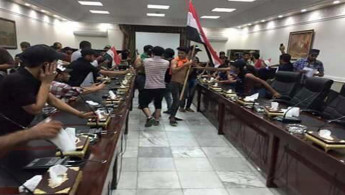Protesters dispersed after entering Iraq PM's office
Dozens of fatalities were reported when thousands of Muqtada al-Sadr supporters forced their way into the secured area, despite facing heavy resistance from security forces.
Extensive military reinforcements and helicopters surrounded the Green Zone as live rounds were shot into the air by Iraqi forces to disperse the protesters.
"Troops were forced to use tear gas, water cannon and gunfire in the air, to prevent the protesters from breaking into the Green Zone," a source in military command told The New Arab.
The supporters also stormed the premier's office Friday.
 |
Troops were forced to use tear gas, water cannon and gunfire in the air, to prevent the protesters from breaking into the Green Zone |  |
They faced tough resistance from forces guarding Prime Minister Haider al-Abadi's office but some were able to muscle past and temporarily enter the premises, though demonstrators were later pushed back by tear gas, water cannons, sound bombs and a barrage of live fire directed into the air.
Abadi reacted by saying that "storming state institutions... cannot be accepted," but added that he supports the "demands of the peaceful protesters."
A curfew was announced due to the unrest - which security and medical officials said wounded at least 58 people, including security personnel - but was soon lifted.
Sadr followers have been protesting for weeks demanding reforms and a new government, and had warned they would again break into the Green Zone if progress was not made.
The cleric vowed on Friday that "peaceful protests" would continue, warning that "the revolution will take another form" if there are attempts to block them.
Demonstrators were enraged by security measures to keep them out of the Green Zone, which were much tougher than they faced when they broke into the restricted area three weeks earlier.
"We came in a peaceful protest but the cowards began shooting at us," said one protester, displaying handfuls of bullet casings, a white cloth shielding his face from tear gas.
"This is the biggest evidence of their cowardice and corruption," said another protester who held up a canister fired by security forces, a black cloth tied around his face.
 |
We came in a peaceful protest but the cowards began shooting at us... This is the biggest evidence of their cowardice and corruption |  |
Some demonstrators even equated Iraqi politicians with the hated Islamic State (IS) group, which frequently kills civilians in bomb attacks.
The protesters gathered at Tahrir Square in central Baghdad before crossing Jumhuriyah Bridge over the Tigris River and converging on the Green Zone.
Some were able to force one of the area's gates and then headed to the prime minister's office.
They confronted security forces guarding the compound, and some protesters eventually forced their way in.
Sadr supporters posted pictures of the premier's office on social media, including from the cabinet meeting room, but the protesters later withdrew.
It was unclear where Abadi was at the time of the breach.
While some demonstrators broke through a Green Zone gate, a much larger crowd of protesters, some of whom threw rocks and other debris over the wall, remained outside.
Security forces sporadically fired tear gas into the crowd, and also shot sound bombs and live rounds overhead and sprayed demonstrators with water cannons.
Security and medical sources said some people were wounded by bullets, but most of the fire was directed into the air, and tear gas accounted for the majority of the injuries.
Protesters managed to hold the gate for some time despite repeatedly being tear gassed, but security forces eventually sallied out, firing automatic weapons into the air and unleashing more tear gas.
They forced the demonstrators back down a street alongside the Green Zone, harrying them with tear gas canisters that hissed into the crowd.
Ambulances became caught in the mass of people packing the street, which was divided by coils of barbed wire running down the median that also impeded movement.
Security forces eventually pushed the demonstrators back across Jumhuriyah Bridge.
Similar scenes erupted on April 30 when demonstrators who had been protesting for weeks to demand a cabinet reshuffle and reforms broke into the fortified Green Zone and stormed Baghdad's parliament.
A months-old political crisis in Iraq has led to repeated mass demonstrations and has hampered the functioning of the government at a time when the country is battling the IS group on several fronts.
Security forces are currently engaged in large-scale military operations in the provinces of Anbar and Nineveh, where IS' two major remaining hubs in Iraq are located.
Hundreds of residents from Baghdad's Sadr City came out on in protest last week, blaming the government for a wave of Islamic State group attacks that rocked the city.
"The government is supposed to put in place certain procedures to protect the people, but they are not offering anything," said Sheikh Kadhim Jassem, 72.
The attacks, the worst to hit the Iraqi capital this year, were claimed by the Islamic State group, but the demonstrators blamed Iraq's political leaders for being too hampered by corruption to deal with the violence plaguing the country.





![The UAE is widely suspected of arming the RSF militia [Getty]](/sites/default/files/styles/image_330x185/public/2024-11/GettyImages-472529908.jpg?h=69f2b9d0&itok=Yauw3YTG)
![Netanyahu furiously denounced the ICC [Getty]](/sites/default/files/styles/image_330x185/public/2024-11/GettyImages-2169352575.jpg?h=199d8c1f&itok=-vRiruf5)
![Both Hamas and the Palestinian Authority welcomed the ICC arrest warrants [Getty]](/sites/default/files/styles/image_330x185/public/2024-11/GettyImages-2178351173.jpg?h=199d8c1f&itok=TV858iVg)